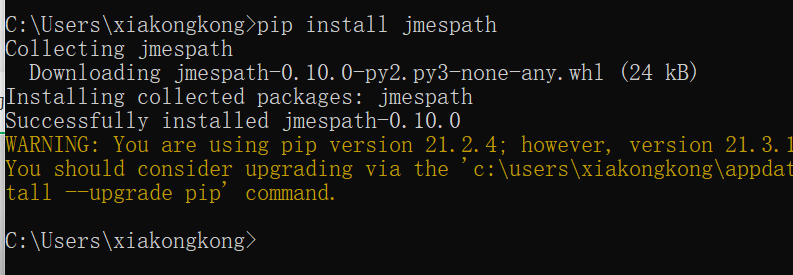Python中jmespath解析提取json数据
在做接口自动化,测试断言时,我们经常需要提取接口的的响应数据字段,以前用过jsonpath,有几篇相关文章,可以参考下(Python深层解析json数据之JsonPath、【Jmeter篇】后置处理器之正则提取器、Json提取器 、Jmeter之json提取器实战(二)、Jmeter之json条件提取实战(三) )今天我们来介绍下jmespath用法,可以帮我们进行数据的灵活提取,下面通过案例来说明jmespath在python的使用。
jmespath官方文档
https://jmespath.org/tutorial.html#projections
jmespath安装
pip install jmespath

字典,通过key名称提取
import jmespathdict_1 = {"a": "foo", "b": "bar", "c": "baz"}print(jmespath.search("c",dict_1))baz
嵌套字典,层级提取
import jmespathdict_1 = {"a": {"b": {"c": {"d": "value"}}}}print(jmespath.search("a.b.c.d",dict_1))valueimport jmespathdict_1 = {"a": {"b": {"c": {"d": "value"}}}}print(jmespath.search("a.b.c",dict_1)){'d': 'value'}
列表,通过索引提取
import jmespathlist_1 = ["a", "b", "c", "d", "e", "f"]print(jmespath.search("[1]",list_1))b
列表、字典嵌套提取
import jmespathsource = {"a": {"b": {"c": [{"d": [0, [1, 2]]},{"d": [3, 4]}]}}}print(jmespath.search("a.b.c[0].d[1][0]",source))1
切片提取列表中值
import jmespathsource = [0, 1, 2, 3, 4, 5, 6, 7, 8, 9]print(jmespath.search("[0:5]",source))[0, 1, 2, 3, 4]import jmespathsource = [0, 1, 2, 3, 4, 5, 6, 7, 8, 9]print(jmespath.search("[5:10]",source))[5, 6, 7, 8, 9]import jmespathsource = [0, 1, 2, 3, 4, 5, 6, 7, 8, 9]print(jmespath.search("[:5]",source))[0, 1, 2, 3, 4]import jmespathsource = [0, 1, 2, 3, 4, 5, 6, 7, 8, 9]print(jmespath.search("[::2]",source))[0, 2, 4, 6, 8]
列表取值使用 * 通配符
1、取出列表中所有 first对应的值
people[*].first
import jmespathsource = {"people": [{"first": "James", "last": "d"},{"first": "Jacob", "last": "e"},{"first": "Jayden", "last": "f"},{"missing": "different"}],"foo": {"bar": "baz"}}print(jmespath.search("people[*].first",source))['James', 'Jacob', 'Jayden']
2、取出列表中前2个first 对应的值
people[:2].first
import jmespathsource = {"people": [{"first": "James", "last": "d"},{"first": "Jacob", "last": "e"},{"first": "Jayden", "last": "f"},{"missing": "different"}],"foo": {"bar": "baz"}}print(jmespath.search("people[:2].first",source))['James', 'Jacob']
对象取值使用 * 通配符
取出ops 对象的任意属性对应的numArgs值 ops.*.numArgs
import jmespathsource = {"ops": {"functionA": {"numArgs": 2},"functionB": {"numArgs": 3},"functionC": {"variadic": 1}}}print(jmespath.search("ops.*.numArgs",source))[2, 3]
子查询使用 * 通配符
在查询的结果中继续使用 * 通配符,查询的结果是列表的列表
import jmespathsource = {"reservations": [{"instances": [{"state": "running"},{"state": "stopped"}]},{"instances": [{"state": "terminated"},{"state": "running"}]}]}print(jmespath.search("reservations[*].instances[*].state",source))[['running', 'stopped'], ['terminated', 'running']]
我们希望结果为[“ running”, “ stopped”, “ terminated”, “ running”]一个状态列表,可以使用 [] 而不是 [*]
print(jmespath.search("reservations[].instances[].state",source))['running', 'stopped', 'terminated', 'running']
过滤器使用
过滤器表达式是为数组定义的,其一般形式为 [?<表达式> <比较器> <表达式>]。
常用的比较表达式可以使用 ==, !=, <, <=, >, > =
假设我们有一个设备列表,每个设备都有一个名称和一个 state。我们想要所有正在运行的计算机的名称
import jmespathsource = {"machines": [{"name": "a", "state": "running"},{"name": "b", "state": "stopped"},{"name": "b", "state": "running"}]}print(jmespath.search("machines[?state=='running'].name",source))['a', 'b']
管道表达式
前面在匹配list里面的多个值时候,查询的结果是一个list,如果我想取出结果里面的第一个可以使用管道符 |
取出people下所有对象的 first 属性,从结果里面取第一个值:people[*].first | [0]
import jmespathsource = {"people": [{"first": "James", "last": "d"},{"first": "Jacob", "last": "e"},{"first": "Jayden", "last": "f"},{"missing": "different"}],"foo": {"bar": "baz"}}print(jmespath.search("people[*].first | [0]",source))James
多选列表创建一个列表
到目前为止,我们已经研究了JMESPath表达式,这些表达式有助于将JSON文档缩减为您感兴趣的元素。下一个概念, 多选列表和 多选哈希允许您创建JSON元素。这使您可以创建JSON文档中不存在的元素。多选列表创建一个列表,多选哈希创建一个JSON对象。
这是一个多选列表的示例:people[].[name, state.name]
import jmespathsource = {"people": [{"name": "a","state": {"name": "up"}},{"name": "b","state": {"name": "down"}},{"name": "c","state": {"name": "up"}}]}print(jmespath.search("people[].[name, state.name]",source))[['a', 'up'], ['b', 'down'], ['c', 'up']]
在上面的表达式中,[name, state.name]部分是一个多选列表。它说要创建一个由两个元素组成的列表,第一个元素是针对list元素评估名称表达式的结果,第二个元素是对state.name评估的结果。因此,每个列表元素将创建一个两个元素列表,并且整个表达式的最终结果是两个元素列表的列表。
与投影不同,即使结果为null,也始终包含表达式的结果。如果将以上表达式更改为people []。[foo, bar],则每个两个元素列表将为[null, null]。
多重选择具有与多重选择列表相同的基本概念,不同之处在于它会创建哈希而不是数组。使用上面的相同示例,如果我们想创建一个具有两个键Name和 State的两个元素哈希,则可以使用以下代码:
import jmespathsource = {"people": [{"name": "a","state": {"name": "up"}},{"name": "b","state": {"name": "down"}},{"name": "c","state": {"name": "up"}}]}print(jmespath.search("people[].{Name: name, State: state.name}",source))[{'Name': 'a', 'State': 'up'}, {'Name': 'b', 'State': 'down'}, {'Name': 'c', 'State': 'up'}]
函数的使用
JMESPath支持函数表达式,例如:length(people)
import jmespathsource = {"people": [{"name": "b","age": 30,"state": {"name": "up"}},{"name": "a","age": 50,"state": {"name": "down"}},{"name": "c","age": 40,"state": {"name": "up"}}]}print(jmespath.search("length(people)",source))3
函数可用于以强大的方式转换和过滤数据。可以在此处找到函数的完整列表,并且 函数表达式规范具有完整的详细信息。
以下是一些功能示例。
本示例在people数组中打印最老的人的名字:
import jmespathsource = {"people": [{"name": "b","age": 30},{"name": "a","age": 50},{"name": "c","age": 40}]}print(jmespath.search("max_by(people, &age).name",source))a
函数也可以与过滤器表达式组合。在下面的示例中,JMESPath表达式在myarray中查找包含字符串foo的所有元素。
import jmespathsource = {"myarray": ["foo","foobar","barfoo","bar","baz","barbaz","barfoobaz"]}print(jmespath.search("myarray[?contains(@, 'foo') == `true`]",source))['foo', 'foobar', 'barfoo', 'barfoobaz']
场景一,接口响应数据,提取code、msg、status字段进行断言
source = {"code": 0,"msg": "成功","trace": "ad12de4","data": {"total": 205,"list": [{"id": 15000087,"name": "促销员","job_nature": 2,"category_id": 61,"user_id": 589601,"company_id": 5084,"group_id": 5084,"status": 4,"audit_type": 0,"company_name": "二十二门店","job_nature_zh": "兼职","salary_zh": "1000元\/时","show_status": 5,"manage_status_reason": "","status_zh": "停招","browse_users_num": 0,"communication_users_num": 0,"sign_up_users_num": 0,"job_card_time_remaining": 22,"job_top_card_time_remaining": 0}, {"id": 15000078,"name": "促销员","job_nature": 1,"category_id": 61,"user_id": 589601,"company_id": 1000064,"group_id": 5084,"status": 4,"audit_type": 100,"company_name": "二十二门店","job_nature_zh": "全职","salary_zh": "2000-3000元\/月","show_status": 6,"manage_status_reason": "","status_zh": "停招","browse_users_num": 0,"communication_users_num": 0,"sign_up_users_num": 0,"job_card_time_remaining": 0,"job_top_card_time_remaining": 0}, {"id": 15000077,"name": "促销员","job_nature": 1,"category_id": 61,"user_id": 589601,"company_id": 5084,"group_id": 5084,"status": 4,"audit_type": 100,"company_name": "二十二门店","job_nature_zh": "全职","salary_zh": "2000-3000元\/月","show_status": 2,"manage_status_reason": "","status_zh": "停招","browse_users_num": 0,"communication_users_num": 0,"sign_up_users_num": 0,"job_card_time_remaining": 0,"job_top_card_time_remaining": 0}, {"id": 13076362,"name": "收银员","job_nature": 2,"category_id": 97,"user_id": 589601,"company_id": 5084,"group_id": 5084,"status": 4,"audit_type": 1,"company_name": "二十二门店","job_nature_zh": "兼职","salary_zh": "1000元\/时","show_status": 2,"manage_status_reason": "","status_zh": "停招","browse_users_num": 0,"communication_users_num": 0,"sign_up_users_num": 0,"job_card_time_remaining": 0,"job_top_card_time_remaining": 0}, {"id": 13076361,"name": "品类管理","job_nature": 1,"category_id": 102,"user_id": 589601,"company_id": 5084,"group_id": 5084,"status": 1,"audit_type": 1,"company_name": "二十二门店","job_nature_zh": "全职","salary_zh": "2000-3000元\/月","show_status": 1,"manage_status_reason": "","status_zh": "招聘中","browse_users_num": 3,"communication_users_num": 1,"sign_up_users_num": 1,"job_card_time_remaining": 342,"job_top_card_time_remaining": 0}]}}print(jmespath.search("code",source)) # 0print(jmespath.search("msg",source)) # 成功print(jmespath.search("data.list[].status",source)) # [4, 4, 4, 4, 1]
场景二,接口响应数据,提取列表类模块某字段进行断言
import jmespathsource = [{"Name": "晨练指数","ID": 100,"Ascending": 1,"LocalDateTime": "2021-11-11T07:00:00+08:00","EpochDateTime": 1636585200,"Value": 4.0,"Category": "不宜","CategoryValue": 4,"MobileLink": "http://m.weathercn.com/zh/cn/pudong-new-district/74761/weather-forecast/74761?lang=zh-cn","Link": "http://m.weathercn.com/zh/cn/pudong-new-district/74761/weather-forecast/74761?lang=zh-cn"}, {"Name": "穿衣指数","ID": 101,"Ascending": 1,"LocalDateTime": "2021-11-11T07:00:00+08:00","EpochDateTime": 1636585200,"Value": 5.0,"Category": "初冬装","CategoryValue": 5,"MobileLink": "http://m.weathercn.com/zh/cn/pudong-new-district/74761/weather-forecast/74761?lang=zh-cn","Link": "http://m.weathercn.com/zh/cn/pudong-new-district/74761/weather-forecast/74761?lang=zh-cn"}, {"Name": "感冒指数","ID": 102,"Ascending": 1,"LocalDateTime": "2021-11-11T07:00:00+08:00","EpochDateTime": 1636585200,"Value": 2.0,"Category": "较易发","CategoryValue": 2,"MobileLink": "http://m.weathercn.com/zh/cn/pudong-new-district/74761/weather-forecast/74761?lang=zh-cn","Link": "http://m.weathercn.com/zh/cn/pudong-new-district/74761/weather-forecast/74761?lang=zh-cn"}]print(jmespath.search("[].Name",source))['晨练指数', '穿衣指数', '感冒指数']
